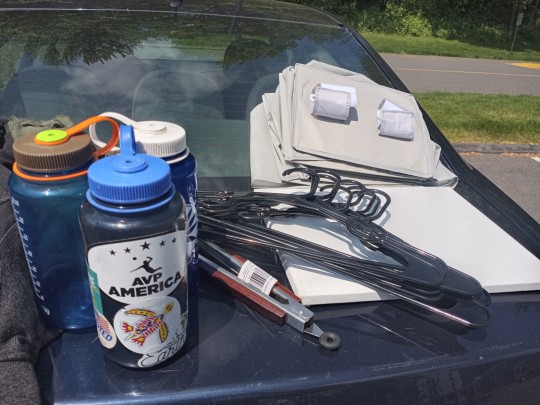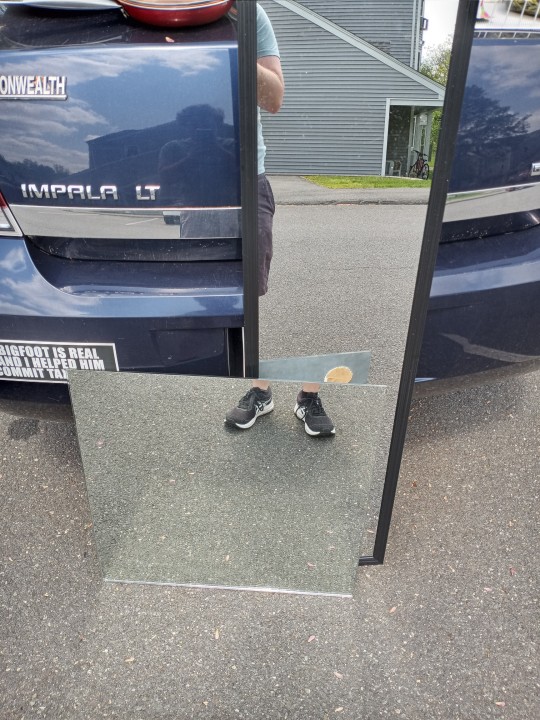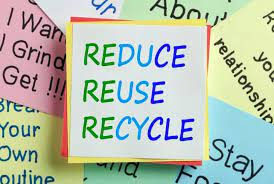#recycling and waste reduction
Explore tagged Tumblr posts
Text
"The slogan 'refuse, reduce, reuse, repair and recycle' provides us with a hierarchy of strategies for dealing with waste. Refuse means to decide not to engage in the consuming action or task in the first place because it is not necessary. Reduce means to minimize the materials and energy required or the frequency of the consuming action. Reuse means either reuse for the same purpose or put to the next best use. Repair means to use skill and very limited additional resources to restore function. Recycle means to break down into more basic elements or materials before being reprocessed for the same or other uses."
- Permaculture: Principles & Pathways Beyond Sustainability by David Holgren, page 112
#permaculture#refuse reduce reuse repair recycle#waste#environmental#sustainability#environment#waste reduction
2K notes
·
View notes
Text
Polyurea Concrete Blocks: Revolutionizing Construction with Durability and Versatility
Introduction In the world of construction, innovation is a constant driving force, enabling builders to create structures that are more durable, sustainable, and efficient. One such innovation that has gained significant attention is the use of polyurea concrete blocks. These blocks, with their unique properties and versatility, are transforming the construction industry. This article delves into…

View On WordPress
#chemical resistance#commercial construction#construction innovation#durable building materials#energy efficiency#flexibility in construction#industrial construction#infrastructure projects#polyurea coating#polyurea concrete blocks#recycling and waste reduction#reduced maintenance costs#residential construction#strength and durability#sustainability in construction#waterproofing
0 notes
Text
#california#good news#environmentalism#science#recycling#fast fashion#usa#waste reduction#clothing#fashion#environment
77 notes
·
View notes
Text
College move out dumpster haul time!


Three water bottles (of my preferred shape), many hangers, good quality tongs, a canvas, hanging shoe organizer, two sweatshirts, and a flannel


5 bowls, 4 plates, some sealed pasta and fruit snacks, an organizer bin, a pair of boots (not my size but good quality, for friends or donation), and two pans with lids


Two mirrors in great condition, a whiteboard, and some generic but nice wall art


Two books (there were more that were severely water damaged), a pocket knife, a hand carved spoon holder, sewing kit, and bracelets that read "I <3 boobies!"
It's abhorrent how much clothes we saw thrown out this year. Unfortunately, a lot of them were left out in the rain all day yesterday and so were no longer in good quality to be donated. What was nice is that a lot of other people were also diving this year, so a lot more goods were being saved including a very nice kitchen cart that I wanted but couldn't fit in my car.
#dumpster diving#free stuff#anticonsumerism#college move out#ecopunk#mine#waste reduction#reduce reuse recycle
152 notes
·
View notes
Text
10 Effective Strategies for Solid Waste Management: Reduce, Reuse, Recycle!
Introduction
Welcome to our blog post on effective strategies for solid waste management! In today's world, where environmental concerns are paramount, adopting proper waste management practices is crucial. By following the three R's: Reduce, Reuse, and Recycle, we can make a significant impact on minimizing waste generation and preserving our planet's resources. Let's dive into the ten strategies that can help us achieve sustainable waste management.
1. Conduct a Waste Audit
According to the Water Treatment Plant Manufacturers in India to effectively manage waste, it's essential to understand the current waste generation and disposal patterns. Conducting a waste audit will provide valuable insights into the types and quantities of waste produced, allowing for targeted interventions.
2. Embrace Source Reduction

3. Promote Reuse and Repurposing
Encouraging reuse and repurposing of items helps reduce waste and extends the lifespan of products. Consider donating or selling unwanted items, participating in local swap events, and embracing creative DIY projects to give new life to old objects.
4. Implement Recycling Programs
Setting up recycling stations and educating employees and the community about proper recycling practices is vital. Ensure clear signage, separate bins for different recyclable materials, and provide educational materials on what can and cannot be recycled.
5. Composting Organic Waste
Composting is an excellent way to manage organic waste, such as food scraps and yard trimmings. It not only reduces waste sent to landfills but also produces nutrient-rich compost that can be used for gardening and landscaping.
6. Encourage Responsible E-Waste Disposal
Electronic waste, or e-waste, requires special handling due to its hazardous components. Educate yourself and others about the proper disposal of electronic devices and consider recycling programs dedicated to e-waste management.
7. Explore Waste-to-Energy Options
Waste-to-energy technologies offer an alternative to traditional waste disposal methods by converting waste into usable energy. Consider exploring options such as incineration, anaerobic digestion, or gasification, while considering the environmental and social impacts.
8. Establish Partnerships with Waste Management Companies
Collaborating with waste management companies that specialize in recycling and waste disposal can provide valuable expertise and services. They can assist with waste collection, recycling processes, and implementing sustainable practices.
9. Educate and Engage the Community
Raising awareness about waste management is crucial for long-term success. Organize community events, workshops, and awareness campaigns to educate people about the importance of proper waste management and involve them in the process.
10. Continuous Monitoring and Improvement
Monitoring waste management practices and tracking progress is essential for identifying areas of improvement. Regularly assess your waste management strategies, analyze data, and make necessary adjustments to achieve better results.
In conclusion, by implementing these ten effective strategies for solid waste management, we can make a significant impact on reducing waste, conserving resources, and creating a cleaner and healthier environment. Let's join hands and work together to embrace the principles of reducing, reusing, and recycling for a sustainable future.
#Waste Management Strategies#10 Ways to Reduce Waste#Waste Reduction and Utilization Strategies#Waste Management Reduce Reuse Recycle#Water Treatment Plant Manufacturers in India#Sewage Treatment Plant Manufacturers in India#Operation and Maintenance of Water Treatment#Operations and Maintenance in Facility Management#Water Treatment Plant Project#Sewage Treatment Plant Project#Effluent Treatment
2 notes
·
View notes
Text
Navigating Sustainable Packaging: Understanding the EU PPWR
The European Union is taking brave steps to redesign the future of packaging through the updated Packaging and Packaging Waste Regulation (PPWR). This ambitious legislation will replace old guidelines with a more stringent framework aimed at reducing packaging waste, increasing recyclability and promoting packaging in the circular economy. If you are working in the EU or exporting to the EU, it is important to understand the EU packaging regulations and prepare for the EU packaging regulations. Main fit area at a glance Focus area It is highlighted Reduced packaging drops minimize packaging volume and weight. Reduces slack filling to 50%. Recyclability by 2030 must be 100% recyclable packaging materials. Reusable content for plastic bottles: 30% recycled content. Contact Plastic: 35% until 2040. Material restrictions prohibit PVC, non-integrable plastics, and disposable cosmetic packaging in hotels. Packaging identification, labeling obligations under clear, standardized names with material type and disposal instructions. High fees for non-recyclable mandatory financial support for advanced producer responsibility (EPR) waste management. Payment Return System (DRS) required for plastic bottles and aluminum doses by 2029. Future deadlines and goals Circular economy in action Regulations exceed the reduction in waste. This is directly agreed to the EU Green Trading and Circular Economy Campaign. From the essentials of biological and compostable materials to the promotion of the use of QR codes for sorting and recycling, PPWR paves the way for sustainable innovation in the industry. What businesses need to do now Please check the current package. Identify potential weight, size and material reductions. Redesigned for recyclability and reusability. Labels with transparency: Implement ecolabelle harmoniously with all products dispersed by the decentralized EU. Plan your EPR package, especially if the packaging is difficult to recycle. DRS Preparation: Adjust the logistics of the deposit return system for the relevant sector. The final thought PPWR packaging and packaging waste regulations are more than regulatory updates. This is a transformative change into a circular economy that values sustainability, efficiency and transparency. As the deadline approaches, the time to act is now. A proactive adaptation company not only ensures compliance, but also strengthens brand reputation and resistance in a sustainability-driven market. At Freyr, we help global companies stay before regulatory shifts by providing end-to-end packaging compliance solutions. We have assured you, from material analysis and environmental features to EPR compliance strategies and sustainability advice. Deep expertise in the EU regulatory framework Global FMCG, pharmaceutical and retail customers' track record Comprehensive sustainability review and design trials Fast and scalable support from concept to compliance Working with Freyr, we will confidently navigate the EU PPWR and create a fully compliant and environmentally friendly packaging system in the future.
#Sustainable Packaging#Packaging Waste Regulation#Circular Economy Packaging#EPR Compliance#Packaging Waste Reduction#Recyclable Packaging
0 notes
Text
World Inspiring Network Secures Bloomberg Youth Climate Action Fund Again
The World Inspiring Network, a nonprofit organization based in Accra, has once again secured a grant under Phase II of the Bloomberg Youth Climate Action Fund to advance its environmental initiatives. This achievement makes the organization the only one in Accra among Kumasi and other cities participating in the fund to have won the award twice, both in Phase I and Phase II. During Phase I,…
#Accra Metropolitan Assembly#Bloomberg Youth Climate Action Fund#Carbon Emission Reduction#Charcoal Briquettes#Circular Economy#Clean Energy#climate change#Climate Innovation#Coconut Waste Recycling#Community Engagement#EcoFlames Initiative#Environmental Sustainability#Ghana Climate Action#green action project#Green Action Summit#Renewable Energy#Sustainable Development Goals#Waste-to-Energy#world inspiring network#youth empowerment#Youth-Led Projects
0 notes
Text


Brown scrap paper doodles because why not !
https://www.instagram.com/p/DIi2ckFKTUU/?igsh=MWxleGRleHd2NWpuMQ==
#art#pencil drawing#doodle#drawing#doodle of the day#reduce reuse recycle#waste reduction#elf#elf art
0 notes
Text

Recycling is easier than you think! Check out four common items you can recycle, including paper, plastic, glass, and electronics. Do your part in protecting the environment by making smart recycling choices!
#recycling tips#what to recycle#eco-friendly living#waste reduction#sustainable recycling#recyclable materials#go green
0 notes
Text
HARVESTING HOPE AND THE CONCEPT OF FEED FORWARD AT VANAM INDIA FOUNDATION
Vanam India Foundation, founded in 2015, is an NGO focused on environmental conservation through tree planting, rainwater management, plastic recycling, and organic farming. With over 1,000 members, they inspire sustainable practices and promote eco-friendly actions. Their rainwater initiatives help prevent erosion and recharge groundwater. Vanam also advocates for organic farming and recycling to reduce waste. The foundation’s efforts continue to inspire positive environmental change and a greener future.
To know more : https://vanamindiafoundation.org/27/blog_detail
#organicfarming#environmentalimpact#youthfornature#natureconservation#climateaction#gogreen#wildlifeconservation#ecorevolution#greencover#ecofriendly#Environmental Conservation#Afforestation#Rainwater Harvesting#Sustainability#Organic Farming#Plastic Recycling#Eco-Friendly Practices#Green Initiatives#Tree Plantation#Biodiversity Support#Groundwater Recharge#Carbon Footprint Reduction#Waste Management
0 notes
Text
Discover eco-friendly cartridge recycling solutions with Surplus Toner Buyer. Sell, recycle, or donate your unused ink and toner cartridges to reduce waste and earn cash. Join us in promoting sustainability today!
#eco-friendly cartridge recycling#recycle ink cartridges#toner recycling solutions#sell unused cartridges#sustainable printer ink disposal#Surplus Toner Buyer#cartridge waste reduction#eco-friendly toner disposal#recycle printer supplies#green printing solutions.
0 notes
Text
Garbage Collection Company: Streamlined Services for Everyone

In our modern world, where convenience and efficiency are essential, reliable garbage collection has become increasingly important. As urban areas expand and populations grow, the challenge of waste management intensifies. Garbage collection companies play a crucial role in maintaining cleanliness, public health, and environmental sustainability. In this blog, we’ll explore how these companies streamline their services to cater to households, businesses, and communities alike.
The Role of Garbage Collection Companies
Garbage collection companies are vital in ensuring the safe and efficient removal of waste from various sources, including residential, commercial, and industrial sectors. Their services go beyond mere trash pickup; they are key players in waste management strategies that promote environmental health.
Why Waste Management Matters
Effective waste management is not just about collecting trash; it involves a series of activities aimed at minimizing environmental impact. Key aspects include:
Collection and Transportation: Efficient systems to gather and transport waste to disposal or recycling facilities.
Disposal: Safe methods for disposing of waste, such as landfilling or incineration.
Recycling and Composting: Converting materials into reusable resources to reduce landfill usage.
Public Education: Raising awareness about waste reduction and responsible disposal.
Proper waste management is essential for maintaining community health and environmental integrity. It helps reduce pollution, conserve resources, and foster sustainable practices.
Streamlined Services Provided by Garbage Collection Companies
Garbage collection companies are continuously evolving to meet customer needs, employing innovative strategies and technologies. Here are some of the key services that enhance efficiency and customer satisfaction:
1. Customized Collection Schedules
Recognizing that each household and business has unique waste disposal needs, many companies now offer customizable collection schedules. Clients can choose collection days that best suit their needs, whether weekly, bi-weekly, or on-demand. This flexibility helps prevent overflow and ensures effective waste management.
2. Multiple Waste Streams
Modern garbage collection companies encourage waste segregation by offering separate collection services for:
General Waste: Non-recyclable items.
Recyclables: Paper, plastics, glass, and metals.
Organic Waste: Food scraps and yard waste for composting.
By promoting waste separation at the source, these companies facilitate recycling and composting, significantly reducing landfill waste.
3. Advanced Technology Integration
Technology plays a crucial role in optimizing garbage collection. Innovations like GPS tracking and route optimization enhance operational efficiency:
GPS Tracking: Allows companies to monitor their fleet in real-time, ensuring timely pickups and minimizing fuel consumption.
Route Optimization: Algorithms determine the most efficient collection routes, reducing travel time and operational costs.
4. Bulk Waste Collection Services
Many companies provide bulk waste collection for larger items that regular trash services cannot handle. This includes furniture, appliances, and yard waste. Scheduled bulk pickups make it easier for residents to dispose of large items responsibly.
5. Recycling Programs and Incentives
To promote recycling, many companies have implemented programs that incentivize customers, such as:
Discounts for Recycling: Reduced rates for clients who consistently recycle.
Educational Workshops: Community events that teach proper recycling practices.
Recycling Contests: Friendly competitions that encourage neighborhoods to increase their recycling efforts.
These initiatives not only divert waste from landfills but also foster a culture of sustainability.
6. E-Waste Collection Services
With the rapid advancement of technology, electronic waste (e-waste) poses significant environmental challenges. Many garbage collection companies now offer specialized services for e-waste collection and disposal, ensuring safe handling of harmful materials. Services can include:
Drop-off Events: Opportunities for residents to bring in e-waste for safe disposal.
Partnerships with Certified Recyclers: Collaborations that ensure e-waste is processed responsibly.
7. Community Engagement and Support
Garbage collection companies actively engage with their local communities to raise awareness about waste management. This includes sponsoring clean-up days, participating in environmental fairs, and providing educational resources on waste reduction. Community involvement fosters a sense of responsibility and encourages sustainable behaviors.
Environmental Impact of Garbage Collection Services
The work of garbage collection companies extends beyond maintaining cleanliness; it significantly impacts environmental health. Here are some key benefits:
1. Reduced Landfill Waste
By promoting recycling and composting, garbage collection companies help divert waste from landfills. This not only conserves space but also minimizes greenhouse gas emissions from decomposing organic matter.
2. Conservation of Resources
Recycling programs allow valuable materials to be recovered and reused, reducing the need for new resources. This conservation effort leads to lower energy consumption and decreased pollution.
3. Pollution Prevention
Efficient waste collection practices help prevent illegal dumping and littering, protecting land and waterways from contamination. Reliable services contribute to cleaner, healthier environments.
4. Support for Sustainable Practices
Through community education and engagement, garbage collection companies promote sustainable practices, encouraging individuals and businesses to adopt greener habits, such as reducing single-use plastics and composting.
Challenges Faced by Garbage Collection Companies
Despite their vital role, garbage collection companies encounter several challenges in delivering streamlined services:
1. Increasing Waste Generation
As populations grow and consumption patterns change, the amount of waste generated continues to rise. Companies must adapt to increasing demand while maintaining efficiency.
2. Contamination of Recyclables
Contamination—when non-recyclable items are placed in recycling bins—remains a significant challenge. This can lead to entire loads being sent to landfills, undermining recycling efforts. Educating the public on proper recycling practices is essential.
3. Regulatory Compliance
Navigating complex regulations and environmental laws can be daunting. Garbage collection companies must stay compliant while providing quality services, particularly smaller firms that may lack resources.
4. Infrastructure Limitations
In some areas, outdated infrastructure hinders efficient waste collection and processing. Upgrading facilities and equipment requires significant investment, posing challenges for many companies.
The Future of Garbage Collection Services
As we look ahead, the garbage collection industry is set for transformation. Several trends and innovations are shaping the future of waste management:
1. Enhanced Automation
Automation is expected to play a larger role in waste collection. Automated trucks, robotic sorting systems, and AI-driven analytics can streamline operations and improve efficiency.
2. Greater Emphasis on Sustainability
With increasing awareness of environmental issues, garbage collection companies are likely to prioritize sustainable practices further. This may involve expanding recycling programs and exploring waste-to-energy technologies.
3. Smart City Initiatives
As cities evolve, garbage collection services will be integrated into broader urban planning efforts. Real-time data collection and improved coordination with other municipal services are likely to enhance efficiency.
4. Community-Centric Approaches
Future services will continue to focus on community engagement and education. By fostering partnerships with residents, businesses, and local organizations, companies can create tailored solutions that address specific community needs.
Conclusion
Garbage collection companies are essential to maintaining public health, environmental sustainability, and community cleanliness. Through streamlined services, advanced technology, and community involvement, these companies are evolving to meet diverse client needs.
As challenges in waste management grow, the importance of effective garbage collection becomes increasingly clear. By supporting these companies and adopting responsible waste practices, we can all contribute to a cleaner, healthier, and more sustainable future. Whether you’re a homeowner, business owner, or community leader, understanding the value of garbage collection services is crucial in our collective effort to manage waste responsibly and protect our planet.
#garbage collection#waste management#recycling#environmental sustainability#community engagement#waste disposal#e-waste#bulk waste collection#technology in waste management#public health#sustainable practices#smart cities#contamination#landfill reduction#composting
0 notes
Text
Impact of Construction and Demolition Waste and its Use in Buildings
Introduction Construction and demolition (C&D) waste is a significant environmental concern worldwide. The massive amounts of waste generated from construction and demolition activities pose a threat to the environment and human health. However, innovative approaches have emerged to tackle this issue, focusing on recycling and reusing C&D waste in building projects. This article explores the…

View On WordPress
#building construction#C&D waste#carbon footprint#circular economy#Construction and demolition waste#construction industry#environmental challenges#environmental impact#green building#green building certifications#landfill reduction#quality control#recycled materials#recycling#resource conservation#resource efficiency#reuse#standardized regulations#sustainable practices#sustainable waste management#technical limitations#waste management
2 notes
·
View notes
Text
7 notes
·
View notes
Text
BuySellRam.com is expanding its focus on AI hardware to meet the growing demands of the industry. Specializing in high-performance GPUs, SSDs, and AI accelerators like Nvidia and AMD models, BuySellRam.com offers businesses reliable access to advanced technology while promoting sustainability through the recycling of IT equipment. Read more about how we're supporting AI innovation and reducing e-waste in our latest announcement:
#AI Hardware#GPUs#tech innovation#ai technology#sustainability#Tech Recycling#AI Accelerators#cloud computing#BuySellRam#Tech For Good#E-waste Reduction#AI Revolution#high performance computing#information technology
0 notes
Text
And another thing. I know it’s unpopular right now to criticize individual choices as contributing to waste and pollution and overuse of resources and climate change, etc. But I am going to.
I was brushing up some environmental stats/discussion questions in a kids’ activity packet for work the other day and when I was looking for some up-to-date and sourced things to sub in for what was in there, I found a National Geographic study from I think 2008? (Ironically I don’t have the source available to me right now because I was at work) that found that the average American- based on surveys of regular people on individual consumption, right, not stuff done by American corporations or celebrities- uses between two and twenty times as many material resources in a year than somebody in the rest of the world. Twice as much as someone from France. Twenty times more than somebody from India. There were other countries surveyed and mentioned with numbers between that that were all inarguably developed/industrialized/“first-world” countries.
I saw a post on here this evening that asked “what’s a little luxury you buy when you can? Something a little bit fun or expensive that you just can’t have enough of?” And I was all set to talk about the chai latte concentrate I like to splurge on from Costco which is much more expensive and I go through it more quickly than tea bags but it’s just really delicious. And then OP finished the post with “mine is phone cases.” What????
You’re buying and collecting phone cases? Something you can only use one of at a time? Made of plastic and cheap enough that they’re definitely primarily made by people being paid next to nothing for their labor? Something that is not going to be usable long term because phones do not last more than I suppose several years at best? And that having lots of them doesn’t like convey any sort of utility or advantage because I can think of barely a handful of vague situations where one phone case might have different features from another that makes one more or less convenient in different situations and you might want to switch them out. But only if you couldn’t find or afford a phone case that included all of your desired features at once, which if you’re wasting who knows how much money on “never having enough” phone cases, you could have done.
And like, I don’t know if OP was American. And I know tons of things use plastic and are useless in one way or another but it just struck me as such a specific example of such specifically wasteful behavior like. You don’t need that. Nobody needs that. And there are worse things and more wasteful things and yes corporations are bad and everything else. And I am more environmentally conscious of small things like that than most people I know (and yet I still drive to work every day because the bus would take two hours. Curious I am very intelligent meme etc.) and it’s unrealistic to expect everybody to do everything all the time all of that I know all of that.
But this study had also talked about how Americans, the most wasteful demographic on the literal planet, are also the people a.) most likely to believe that individual choices and consumption do not make an environmental difference, and b.) least likely to feel any guilt over their use of resources.
People who use and waste less than half of the amount of useless junk each of us uses in the US feel more compelled to pay attention to and limit their use of energy and material resources than we do. And not hypothetical billionaires or corporations or whoever. Regular people.
We live on a planet with a lot of finite resources! And we are wasting so many of them on dumb useless bullshit like single-serve individually packaged fucking idk pudding containers or getting a new cell phone every six months or buying your kid a rubber duck or three every time you go to target and a hundred other small things that people in specifically the US just don’t think about and they SHOULD. And I know we can talk about how some people need those single-use plastic squeeze tubes of apple sauce, and I’m sure it’s true. I’m not saying anyone should go around to individuals and question and harass them about their choices. But we should all be thinking way, way more about our own personal choices and the choices made by our families and social circles because the fact remains that 90% of kids would be just fine with a bowl of apple sauce poured from a big glass jar.
#mine#rant#environmental stuff#ughgggghh#I work at an org that specifically teaches recycling and waste reduction to kids (as part of what we do) and my boss came into work a couple#of times last with iced coffee in a disposable plastic cup when SPECIFICALLY one of the lines in our new show is about ‘maybe if I remind#mom that she has a reusable mug she won’t throw away so many coffee cups’#last year our education director got us Xmas gifts which was nice of her but it was a big plastic reusable Starbucks travel cup and it’s#like buddy you see me every day I already own two (ceramic!) travel mugs plus one I borrow from my mom when the dishwasher hasn’t been run#and I need a third for my rotation. I do not need or want this.#and we work! at an org! that promotes environmental consciousness!#and I know that a lot of other people just don’t think to think about stuff like that the way I do I guess? but I also do not understand why#oof#long post#sorry
1 note
·
View note